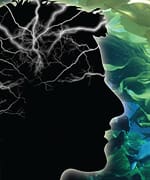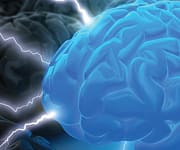Life Extension Magazine®
When NASA scientists began their search for the perfect space food for astronauts, they turned their attention to marine algae. What they discovered was that algae was a rich source of the fatty acid DHA (docosahexaenoic acid). The result of their investigation produced a nutrient dense food that could be used not only for astronauts but for those here on earth.1 DHA is a brain food. Studies show that brain tissue contains the highest concentration of DHA in the body, which indicates its value for brain function.2 Within the brain itself, regions most closely related to memory show the greatest DHA concentrations.3-6 Those with a DHA deficiency often show cognitive deficiencies and an increased risk for Alzheimer's.7,8 Children with high levels of DHA often perform better on tests.9 As a key fatty acid, DHA plays critical roles throughout the body and is a component of the brain's cerebral cortex, the retina, and human sperm. As we age, DHA levels normally drop off in older individuals, especially in the all-important hippocampus region of the brain. Studies have shown that supplementation to older animals results in the normalization of hippocampal DHA content.10,11 Algae-based DHA supplementation increases the omega-3 index by 75%!12 A low omega-3 index indicates high risk for developing coronary artery disease. While most people obtain their DHA from fish or fish oil supplements, NASA's discovery created an option for those who need to boost their vital DHA levels to avoid cognitive degeneration. Thanks to our space program, the benefits of DHA are available for everyone who seeks to avoid the risks of a DHA deficiency. DHA: Triple-Acting Neuroprotection
Large-scale epidemiological studies reveal the benefits of sustained high DHA intake on brain function. Consuming an average of 3g/day of fatty fish offers a 19 to 23% reduction in the risk of mild cognitive impairment, a condition associated with later progression to Alzheimer's disease.14 People who eat still larger amounts of fatty fish may experience protection of up to 75%.14 On the other hand, low fish intake and low blood DHA levels correlate strongly with increased risk of cognitive impairment and especially Alzheimer's.7 Animal studies show learning and memory deficits under conditions of DHA deficiency; studies of the animals' brains demonstrate inflammatory and oxidative damage to neurons.7,8 All of these deleterious effects resolve when adequate DHA intake resumes. Unlike other fats, which accumulate in fat cells for storage and later release for energy, DHA resides almost exclusively in cell membranes, which undergo continuous degradation and renewal.2 That means in turn that your body needs a constant dietary supply of DHA to avoid depletion and neuronal injury. One study showed that DHA supplementation in humans at 2g/day provides sufficient DHA to maintain healthy function, but levels drop when the patients stopped taking the supplements.2 To achieve these levels often requires additional DHA supplementation beyond eating a regular diet of fish. DHA influences how the brain develops and functions; it helps to determine brain structure, and it protects brain tissue from damage. DHA's protective effects come from three distinct mechanisms:
Protectins are nature's way of maintaining the balance between oxidant damage and recovery. They begin to form at the very first sign of damage at the cellular level, whether from a seizure, a stroke, or a traumatic brain injury.4,5,13,15,20 Scientists say that DHA-derived protectins function in a dual manner: they trigger anti-inflammatory processes and simultaneously begin the process of injury resolution.13,15 Acting fast enough and in sufficient quantities, protectins may be able to quash widespread brain degeneration, stopping or slowing neurodegenerative diseases like mild cognitive decline, and even Alzheimer's and Parkinson's diseases. The best way to stimulate protectin synthesis? Make DHA maximally available to brain cells, where it's available for immediate release.20 Let's now look at laboratory and human studies that demonstrate how DHA protects memory, enhances learning, and slows brain aging. Defend Brain Health with Algal-Derived DHA
Studies Highlight DHA Memory-Protection in Brain
As a result, supplemented animals' brains show all the effects that DHA produces, including enhanced outgrowth of connections between neurons, more rapid transmission of electrical pulses across synapses, and protection against the physical and biochemical changes associated with Alzheimer's disease.6,10,11,18,21-24 Blood flow to memory-critical regions of the brain increases following DHA supplementation, and new brain cells form in older animals.25,26 Animals' behavior, especially related to learning and memory, is markedly enhanced after DHA supplementation. Supplemented animals better remember the location of a submerged platform in the Morris water maze test, a standard test of spatial memory of the kind so readily lost in Alzheimer's disease.17,27,28 Similarly, supplemented animals outperform controls on tests of reference memory (the ability to relate current conditions to those experienced in the past).29 And in those animals, brain regions related to memory show higher concentrations of DHA than do controls.29 Exercise enhances brain plasticity, the neuronal flexibility that underlies learning; now studies reveal that DHA supplementation provides a synergistic boost to regular exercise.30 Exercised and supplemented animals perform better on memory tasks than do those receiving either treatment alone.30,31 DHA-protected brains function better in the event of physical trauma to the head. Animals supplemented with DHA before undergoing experimental traumatic brain injury show reduced injury responses in brain tissue, including a reduction in the tragic diffuse axonal injury suffered by many human victims of head trauma.32 Low brain concentrations of DHA are thought to contribute to the cognitive decline seen in Alzheimer's disease.22,33,34 Conversely, higher DHA levels correlate well with improved performance on tests of memory and learning, as seen in a landmark study of school children in Canada. Children followed from birth to 11 years of age, and who had higher DHA levels in their blood at birth and at the time of testing, had better performance on memory and learning tests.9 Numerous studies have demonstrated the protective effects of DHA supplementation on cognitive function and memory. The effects are most pronounced in people with minimal cognitive impairment, or MCI, which is a mild form of cognitive decline that often proceeds to Alzheimer's disease. Roughly 15% of people with MCI will progress to Alzheimer's disease each year, while only about 1% of those without MCI do so. In one such study, a relatively low dose of DHA and another fatty acid improved memory and attention scores in patients with MCI and organic brain injury, but not in the Alzheimer's disease patients.35 Similarly, older adults with MCI took DHA plus melatonin and tryptophan as an emulsion for 12 weeks, and underwent a battery of cognitive, behavioral and nutritional tests. Their memories, mental status, and verbal fluency all improved significantly.36 And a combination of DHA with phosphatidylserine, another brain nutrient, improved verbal recall in non-demented older adults with mild cognitive impairment.37 People with mild cognitive impairment may progress to full-blown dementia; if they have symptoms of depression that progress may be faster. In a study of 40 adults with both MCI and depression, a DHA supplement of 1.55 g/day reduced their scores on a depression scale, while at the same time improving their verbal fluency. Those with the highest post-supplement DHA levels reported the greatest improvement in overall physical health.38 In another study, people with age-related cognitive decline, which may or may not progress to Alzheimer's disease, supplemented with 900 mg/day of DHA.39 They made significantly fewer errors on tests of visual and spatial learning and memory, along with improved immediate and delayed verbal recognition memory, compared with control patients. DHA levels in these patients doubled during supplementation, and were closely correlated with improved memory scores. Unfortunately, DHA supplementation, like any other treatment, is much less effective in fully-developed Alzheimer's disease, presumably because so much irreversible damage has already been done. Still, supplementation may ameliorate some of the troubling features of the disease. Alzheimer's patients typically lose weight as a result of lost sense of smell and taste, and a general disinterest in food.36 But supplementation with DHA at 1.7 g/day improved weight gain in patients with mild to moderate Alzheimer's; and again blood concentrations of DHA correlated well with weight gain and appetite improvement.40 Similar studies report improvement in the sense of smell and nutritional intake following DHA supplementation.36 Vegetarians Dangerously Deficient in DHAThose who follow a vegan diet run the risk of a serious DHA deficiency because their diets provide little or no DHA at all. Even a vegetarian diet with dairy and egg products only supplies about 20 mg/day of DHA.41 Until recently, though, vegetarians and vegans could not find acceptable sources of supplemental DHA, leaving them vulnerable to chronic diseases, especially those of the brain that affect cognition and memory.But fish do not make DHA. Predatory ocean fish, our best animal source of omega-3 fatty acids, consume smaller fish and crustaceans.42,43 Those animals, in turn, feed on algae. And algae use specialized enzymes, powered by solar energy, to produce the DHA (and EPA) that we need in order to remain healthy. As a result, all of the DHA we consume originates with tiny one-celled algal organisms. Advances in aquaculture now make large-scale DHA production possible from algal cells grown in culture. First, specialized batch fermenters grow algae under ideal conditions. After harvesting, dryers remove moisture from the biomass, leaving the oil-rich residue. Next, extraction equipment separates the valuable oil from other organic material.43 At the end of the process, only the highly refined oil remains, rich in DHA and entirely free of animal products. This oil meets the strict standards of true vegetarians and even vegans. Can algae-derived DHA replace fish oil as a health-promoting dietary component? Emphatically yes, according to recent human studies. Dosing with algae-derived DHA among vegetarians produces precisely the same increase in serum, red blood cell, and platelet DHA content seen with fish oil supplementation at equivalent doses.44,45 One study showed increases of DHA in serum and platelets of 246% and 225%, respectively, after six weeks supplementation with 1.62 g/day of algae-derived DHA oil.46 As an additional benefit, levels of EPA, another vital omega-3 fatty acid, rose substantially as well, while levels of the inflammation-generating fat arachidonic acid decreased.46 People with low DHA levels stand to gain the most from supplementation using algae-based DHA; one study found a 4 to 5-fold increase in blood levels following supplementation in cystic fibrosis patients, who often have imbalances in their fatty acid content.47 Other studies report that algae-based DHA supplementation increases the "omega-3 index" by 75%.48 A low omega-3 index (the sum of red blood cell membrane EPA plus DHA content) indicates high risk for developing coronary artery disease. After supplementation with 940 mg/day of algal DHA, 69% of supplemented subjects, but none in the placebo group, managed to get their omega-3 index above the recommended 8%.12 And vegetarians supplemented with algae-based DHA enjoy the same drop in cardiovascular risk factors as do non-vegetarians consuming fish oil.42 Those include lowering triglycerides, and the important total cholesterol/HDL cholesterol ratio.12,48 Studies routinely report no side effects or adverse outcomes when patients consume even large doses of algae-derived DHA; the oil has the same excellent bioavailability as fish oil-derived DHA.42,44,45,47-50 Summary
But vegans and vegetarians, until recently, had no practical and acceptable source for DHA. A new process now enables DHA to be extracted from algae, by means of completely vegan-friendly techniques. This DHA oil is equivalent to that derived from fish oil in terms of its bioavailability and impact on the human body. Availability of a vegan/vegetarian-approved form of DHA is especially essential for maintaining brain health, memory, and learning functions. DHA reduces brain inflammation, a main risk factor for Alzheimer's and similar diseases. DHA stimulates new nerve cell growth and production of neuronal features that underlie learning. And recent studies show that DHA is required for production of essential protectins, molecules that initiate healing from the very onset of brain cell injury. An algae-derived DHA enables anyone to increase their DHA intake. If you have any questions on the scientific content of this article, please call a Life Extension® Health Advisor at 1-866-864-3027. References1. Available at: http://spinoff.nasa.gov/spinoff2008/ch_8.html. Accessed August 13, 2012.2. Arterburn LM, Hall EB, Oken H. Distribution, interconversion, and dose response of n-3 fatty acids in humans. Am J Clin Nutr. 2006 Jun;83(6 Suppl):1467S-76S. tarrus r3. Bradbury J. Docosahexaenoic acid (DHA): an ancient nutrient for the modern human brain. Nutrients. 2011 May;3(5):529-54. 4. Bazan NG. The onset of brain injury and neurodegeneration triggers the synthesis of docosanoid neuroprotective signaling. Cell Mol Neurobiol. 2006 Jul-Aug;26(4-6):901-13. 5. Bazan NG, Musto AE, Knott EJ. Endogenous signaling by omega-3 docosahexaenoic acid-derived mediators sustains homeostatic synaptic and circuitry integrity. Mol Neurobiol. 2011 Oct;44(2):216-22. 6. Cao D, Kevala K, Kim J, et al. Docosahexaenoic acid promotes hippocampal neuronal development and synaptic function. J Neurochem. 2009 Oct;111(2):510-21. 7. Pauwels EK, Volterrani D, Mariani G, Kairemo K. Fatty acid facts, Part IV: docosahexaenoic acid and Alzheimer's disease. A story of mice, men and fish. Drug News Perspect. 2009 May;22(4):205-13. 8. Xiao Y, Wang L, Xu RJ, Chen ZY. DHA depletion in rat brain is associated with impairment on spatial learning and memory. Biomed Environ Sci. 2006 Dec;19(6):474-80. 9. Boucher O, Burden MJ, Muckle G, et al. Neurophysiologic and neurobehavioral evidence of beneficial effects of prenatal omega-3 fatty acid intake on memory function at school age. Am J Clin Nutr. 2011 May;93(5):1025-37. 10. Su HM. Mechanisms of n-3 fatty acid-mediated development and maintenance of learning memory performance. J Nutr Biochem. 2010 May;21(5):364-73. 11. Connor S, Tenorio G, Clandinin MT, Sauve Y. DHA supplementation enhances high-frequency, stimulation-induced synaptic transmission in mouse hippocampus. Appl Physiol Nutr Metab. 2012 Jun 20. 12. Geppert J, Kraft V, Demmelmair H, Koletzko B. Docosahexaenoic acid supplementation in vegetarians effectively increases omega-3 index: a randomized trial. Lipids. 2005 Aug;40(8):807-14. 13. Bazan NG. Neuroprotectin D1 (NPD1): a DHA-derived mediator that protects brain and retina against cell injury-induced oxidative stress. Brain Pathol. 2005 Apr;15(2):159-66. 14. Available at: http://www.ncbi.nlm.nih.gov/pubmed/21452466. Accessed August 9, 2012. 15. Bazan NG, Molina MF, Gordon WC. Docosahexaenoic acid signalolipidomics in nutrition: significance in aging, neuroinflammation, macular degeneration, Alzheimer's, and other neurodegenerative diseases. Annu Rev Nutr. 2011 Aug 21;31:321-51. 16. Lukiw WJ, Bazan NG. Inflammatory, apoptotic, and survival gene signaling in Alzheimer's disease. A review on the bioactivity of neuroprotectin D1 and apoptosis. Mol Neurobiol. 2010 Aug;42(1):10-6. 17. He C, Qu X, Cui L, Wang J, Kang JX. Improved spatial learning performance of fat-1 mice is associated with enhanced neurogenesis and neuritogenesis by docosahexaenoic acid. Proc Natl Acad Sci U S A. 2009 Jul 7;106(27):11370-5. 18. Hashimoto M, Hossain S, Shimada T, Shido O. Docosahexaenoic acid-induced protective effect against impaired learning in amyloid beta-infused rats is associated with increased synaptosomal membrane fluidity. Clin Exp Pharmacol Physiol. 2006 Oct;33(10):934-9. 19. Yamashima T. A putative link of PUFA, GPR40 and adult-born hippocampal neurons for memory. Prog Neurobiol. 2008 Feb;84(2):105-15. 20. Bazan NG, Marcheselli VL, Cole-Edwards K. Brain response to injury and neurodegeneration: endogenous neuroprotective signaling. Ann N Y Acad Sci. 2005 Aug;1053:137-47. 21. Hashimoto M, Hossain S, Agdul H, Shido O. Docosahexaenoic acid-induced amelioration on impairment of memory learning in amyloid beta-infused rats relates to the decreases of amyloid beta and cholesterol levels in detergent-insoluble membrane fractions. Biochim Biophys Acta. 2005 Dec 30;1738(1-3):91-8. 22. Cole GM, Frautschy SA. Docosahexaenoic acid protects from amyloid and dendritic pathology in an Alzheimer's disease mouse model. Nutr Health. 2006;18(3):249-59. 23. Oster T, Pillot T. Docosahexaenoic acid and synaptic protection in Alzheimer's disease mice. Biochim Biophys Acta. 2010 Aug;1801(8):791-8. 24. Hashimoto M, Katakura M, Hossain S, Rahman A, Shimada T, Shido O. Docosahexaenoic acid withstands the Abeta(25-35)-induced neurotoxicity in SH-SY5Y cells. J Nutr Biochem. 2011 Jan;22(1):22-9. 25. Dyall SC, Michael GJ, Michael-Titus AT. Omega-3 fatty acids reverse age-related decreases in nuclear receptors and increase neurogenesis in old rats. J Neurosci Res. 2010 Aug 1;88(10):2091-102. 26. Hooijmans CR, Van der Zee CE, Dederen PJ, et al. DHA and cholesterol containing diets influence Alzheimer-like pathology, cognition and cerebral vasculature in APPswe/PS1dE9 mice. Neurobiol Dis. 2009 Mar;33(3):482-98. 27. Chung WL, Chen JJ, Su HM. Fish oil supplementation of control and (n-3) fatty acid-deficient male rats enhances reference and working memory performance and increases brain regional docosahexaenoic acid levels. J Nutr. 2008 Jun;138(6):1165-71. 28. Hashimoto M, Hossain S. Neuroprotective and ameliorative actions of polyunsaturated fatty acids against neuronal diseases: beneficial effect of docosahexaenoic acid on cognitive decline in Alzheimer's disease. J Pharmacol Sci. 2011;116(2):150-62. 29. Petursdottir AL, Farr SA, Morley JE, Banks WA, Skuladottir GV. Effect of dietary n-3 polyunsaturated fatty acids on brain lipid fatty acid composition, learning ability, and memory of senescence-accelerated mouse. J Gerontol A Biol Sci Med Sci. 2008 Nov;63(11):1153-60. 30. Wu A, Ying Z, Gomez-Pinilla F. Docosahexaenoic acid dietary supplementation enhances the effects of exercise on synaptic plasticity and cognition. Neuroscience. 2008 Aug 26;155(3):751-9. 31. Chytrova G, Ying Z, Gomez-Pinilla F. Exercise contributes to the effects of DHA dietary supplementation by acting on membrane-related synaptic systems. Brain Res. 2010 Jun 23;1341:32-40. 32. Mills JD, Hadley K, Bailes JE. Dietary supplementation with the omega-3 fatty acid docosahexaenoic acid in traumatic brain injury. Neurosurgery. 2011 Feb;68(2):474-81; discussion 81. 33. Astarita G, Jung KM, Berchtold NC, et al. Deficient liver biosynthesis of docosahexaenoic acid correlates with cognitive impairment in Alzheimer's disease. PLoS One. 2010;5(9):e12538. 34. Lim GP, Calon F, Morihara T, et al. A diet enriched with the omega-3 fatty acid docosahexaenoic acid reduces amyloid burden in an aged Alzheimer mouse model. J Neurosci. 2005 Mar 23;25(12):3032-40. 35. Kotani S, Sakaguchi E, Warashina S, et al. Dietary supplementation of arachidonic and docosahexaenoic acids improves cognitive dysfunction. Neurosci Res. 2006 Oct;56(2):159-64. 36. Rondanelli M, Opizzi A, Faliva M, et al. Effects of a diet integration with an oily emulsion of DHA-phospholipids containing melatonin and tryptophan in elderly patients suffering from mild cognitive impairment. Nutr Neurosci. 2012 Mar;15(2):46-54. 37. Vakhapova V, Cohen T, Richter Y, Herzog Y, Korczyn AD. Phosphatidylserine containing omega-3 fatty acids may improve memory abilities in non-demented elderly with memory complaints: a double-blind placebo-controlled trial. Dement Geriatr Cogn Disord. 2010;29(5):467-74. 38. Sinn N, Milte CM, Street SJ, et al. Effects of n-3 fatty acids, EPA v. DHA, on depressive symptoms, quality of life, memory and executive function in older adults with mild cognitive impairment: a 6-month randomised controlled trial. Br J Nutr. 2012 Jun;107(11):1682-93. 39. Yurko-Mauro K, McCarthy D, Rom D, et al. Beneficial effects of docosahexaenoic acid on cognition in age-related cognitive decline. Alzheimers Dement. 2010 Nov;6(6):456-64. 40. Irving GF, Freund-Levi Y, Eriksdotter-Jonhagen M, et al. Omega-3 fatty acid supplementation effects on weight and appetite in patients with Alzheimer's disease: the omega-3 Alzheimer's disease study. J Am Geriatr Soc. 2009 Jan;57(1):11-7. 41. Sanders TA. DHA status of vegetarians. Prostaglandins Leukot Essent Fatty Acids. 2009 Aug-Sep;81(2-3):137-41. 42. Doughman SD, Krupanidhi S, Sanjeevi CB. Omega-3 fatty acids for nutrition and medicine: considering microalgae oil as a vegetarian source of EPA and DHA. Curr Diabetes Rev. 2007 Aug;3(3):198-203. 43. Zeller S. GRAS Exemption claim for DHA algal oil derived from Schizochytrium sp. as a source of DHA for use in foods. In: Bonnette RE, edWashington, DC2003. 44. Arterburn LM, Oken HA, Hoffman JP, et al. Bioequivalence of Docosahexaenoic acid from different algal oils in capsules and in a DHA-fortified food. Lipids. 2007 Nov;42(11):1011-24. 45. Arterburn LM, Oken HA, Bailey Hall E, Hamersley J, Kuratko CN, Hoffman JP. Algal-oil capsules and cooked salmon: nutritionally equivalent sources of docosahexaenoic acid. J Am Diet Assoc. 2008 Jul;108(7):1204-9. 46. Conquer JA, Holub BJ. Supplementation with an algae source of docosahexaenoic acid increases (n-3) fatty acid status and alters selected risk factors for heart disease in vegetarian subjects. J Nutr. 1996 Dec;126(12):3032-9. 47. Lloyd-Still JD, Powers CA, Hoffman DR, et al. Bioavailability and safety of a high dose of docosahexaenoic acid triacylglycerol of algal origin in cystic fibrosis patients: a randomized, controlled study. Nutrition. 2006 Jan;22(1):36-46. 48. Bernstein AM, Ding EL, Willett WC, Rimm EB. A meta-analysis shows that docosahexaenoic acid from algal oil reduces serum triglycerides and increases HDL-cholesterol and LDL-cholesterol in persons without coronary heart disease. J Nutr. 2012 Jan;142(1):99-104. 49. Innis SM, Hansen JW. Plasma fatty acid responses, metabolic effects, and safety of microalgal and fungal oils rich in arachidonic and docosahexaenoic acids in healthy adults. Am J Clin Nutr. 1996 Aug;64(2):159-67. 50. Geppert J, Kraft V, Demmelmair H, Koletzko B. Microalgal docosahexaenoic acid decreases plasma triacylglycerol in normolipidaemic vegetarians: a randomised trial. Br J Nutr. 2006 Apr;95(4):779-86. |





